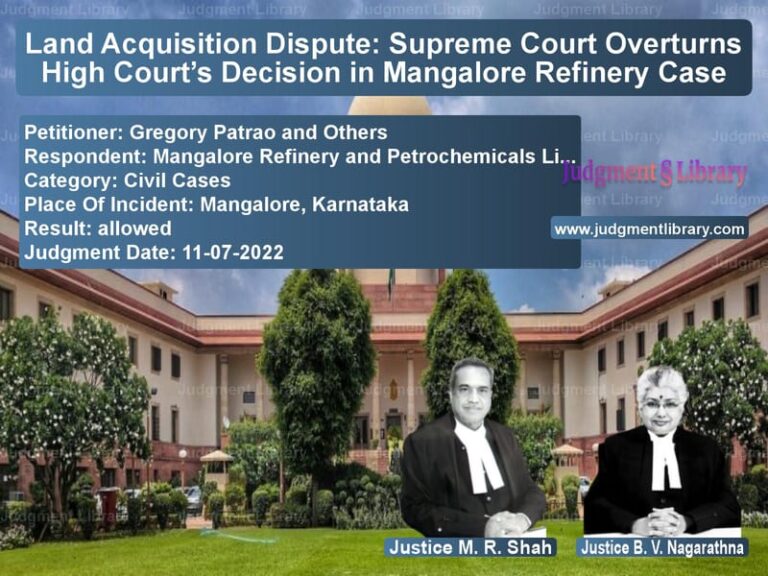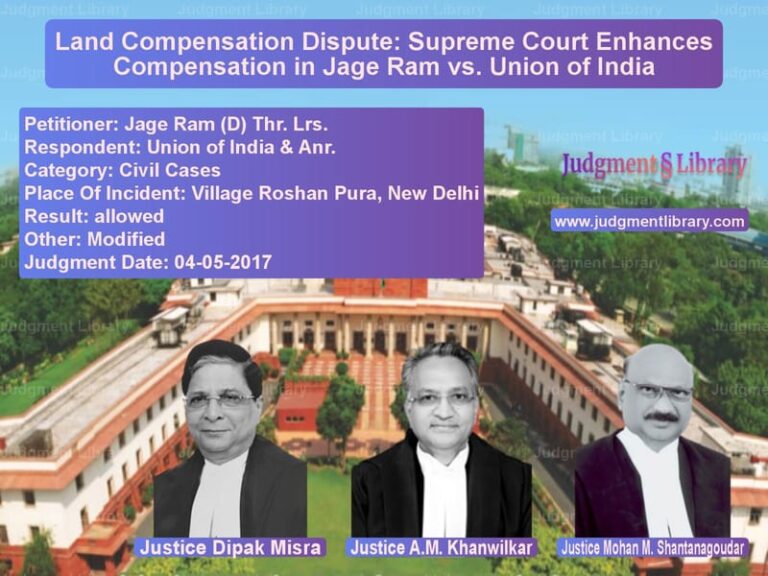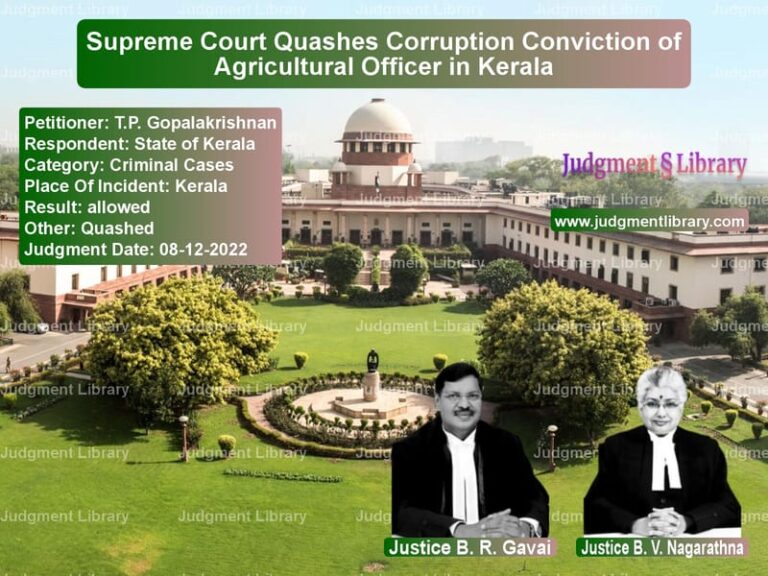Supreme Court Upholds Termination of Power Purchase Agreement in Karnataka
The case of Mangalore Electricity Supply Company Limited (MESCOM) v. M/S AMR Power Private Limited & Anr. revolves around the termination of a Power Purchase Agreement (PPA) between a power distribution licensee and a renewable power generator in Karnataka. The Supreme Court dismissed MESCOM’s appeal, upholding the validity of the termination notice issued by AMR Power Pvt. Ltd.
Background of the Case
The dispute centers on a PPA executed on 02.08.2006 between MESCOM and AMR Power Pvt. Ltd. for the supply of 24 MW electricity. The Karnataka State Electricity Regulatory Commission (KERC) was also involved as the regulatory authority.
The agreement stipulated a tariff of Rs. 2.80 per kilowatt-hour for the first ten years and a tariff to be determined by the Commission thereafter. The agreement also outlined conditions for billing, payment, and termination. AMR Power increased its capacity from 24 MW to 24.75 MW, and it began supplying electricity to MESCOM on 12.09.2009.
Key Legal Issues
- Was MESCOM in default of its financial obligations under the PPA?
- Did AMR Power Pvt. Ltd. lawfully terminate the agreement?
- Could MESCOM seek to enforce the PPA despite non-compliance with its terms?
Arguments from the Appellant (MESCOM)
- MESCOM argued that AMR Power Pvt. Ltd. made multiple attempts to void the PPA, including a petition to declare the agreement null and void.
- It contended that minor delays in payments should not justify the termination of the agreement.
- MESCOM maintained that AMR Power’s withdrawal of an earlier petition before KERC precluded it from raising the same claims in a fresh proceeding.
Arguments from the Respondents (AMR Power Pvt. Ltd.)
- AMR Power Pvt. Ltd. asserted that MESCOM failed to make timely payments as required by the PPA.
- It highlighted that MESCOM had defaulted on payments for electricity supplied in early 2011, with bills remaining unpaid for months.
- The company contended that MESCOM failed to open a Letter of Credit as stipulated in the agreement, constituting a material breach.
Supreme Court’s Judgment
1. MESCOM’s Failure to Meet Financial Obligations
The Supreme Court found that MESCOM’s failure to make timely payments constituted a clear default. The judgment stated:
“The Appellant in its reply to the Default Notice did not deny the delay in payment. The Appellant made an attempt to justify the delay but virtually admitted the same.”
Given this, the Court upheld AMR Power’s assertion that MESCOM had materially breached the agreement.
2. Validity of the Termination Notice
The Court ruled that AMR Power Pvt. Ltd. lawfully terminated the agreement after MESCOM failed to cure its default within 30 days. The judgment stated:
“In view of the default mentioned by the First Respondent in the notice not being remedied within a period of 30 days, we are of the opinion that the termination notice dated 22.07.2011 was valid.”
The Court emphasized that the contractual provisions governing termination were binding on both parties.
3. Rejection of MESCOM’s Estoppel Argument
MESCOM had argued that AMR Power’s withdrawal of a previous petition barred it from terminating the agreement. The Court rejected this argument, holding:
“Withdrawal of a petition without liberty to file a fresh petition does not bar the First Respondent from taking a defense in another round of litigation.”
Implications of the Judgment
This ruling reinforces several legal principles:
- Power purchase agreements are binding and must be adhered to strictly.
- Failure to meet financial obligations under a PPA constitutes a valid ground for termination.
- Withdrawal of a legal claim does not prevent a party from asserting its rights in subsequent litigation.
- Regulatory commissions play a key role in enforcing contractual obligations between power generators and distribution companies.
Key Takeaways
- Energy distribution companies must ensure compliance with contractual payment obligations.
- Power generators have the right to terminate agreements when payment defaults occur.
- Courts will uphold contractual provisions governing default and termination.
- Regulatory oversight is crucial in ensuring fair transactions between power producers and distributors.
Conclusion
The Supreme Court’s decision in Mangalore Electricity Supply Company Limited v. M/S AMR Power Private Limited underscores the importance of financial compliance in power sector contracts. By upholding the termination of the PPA, the Court reinforced the need for timely payments and adherence to contractual obligations in the energy industry.
Don’t miss out on the full details! Download the complete judgment in PDF format below and gain valuable insights instantly!
Download Judgment: Mangalore Electricit vs MS AMR Power Privat Supreme Court of India Judgment Dated 15-09-2016-1741883767121.pdf
Direct Downlaod Judgment: Direct downlaod this Judgment
See all petitions in Contract Disputes
See all petitions in Company Law
See all petitions in Corporate Compliance
See all petitions in Judgment by Anil R. Dave
See all petitions in Judgment by L. Nageswara Rao
See all petitions in dismissed
See all petitions in supreme court of India judgments September 2016
See all petitions in 2016 judgments
See all posts in Corporate and Commercial Cases Category
See all allowed petitions in Corporate and Commercial Cases Category
See all Dismissed petitions in Corporate and Commercial Cases Category
See all partially allowed petitions in Corporate and Commercial Cases Category







